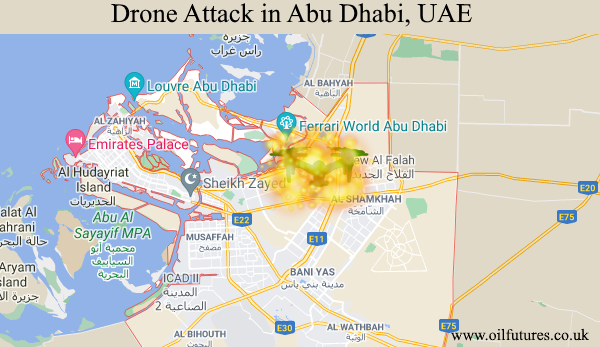The suspected drone attack at the heart of the UAE,
United Arab Emirates, has escalated the prevailing tension in the region to a
dangerous new level, with repercussions directly affecting the energy markets.
In the aftermath of the attack, the crude oil price
rose in the international markets.
As of 09:50 GMT, the price of WTI and Brent were $85.37
and $87.55 respectively.
The UAE has been enjoying peace for decades despite
being in the middle of a highly volatile region – up until the serious drone
attack on Monday.
The reports say three foreign nationals died in the
attack: two Indians and a Pakistani national while 6 sustaining injuries.
The foreign minister of the UAE vowed retaliation
and being true to his words, the Arab
coalition launched air strikes against the Houthis in Yemen, which have resulted
in fatalities.
Saudi Arabia, the world’s largest oil exporter, has
been coming under drone attacks from Houthis for years; the latter usually fire
them across the border between the two countries.
Although they, more often than not, are intercepted
and destroyed by the Patriot defence system, there have been instances, when
drones managed to strike the intended targets, causing damage to properties and
death.
This is the first time that the UAE come under
serious attack at the heart of the country, though, despite being a major
partner of the Arab coalition that bombs Houthi targets in Yemen on regular
basis to keep the former at bay.
The attack came hot on the heels of another incident
involving a UAE-flagged ship off the Yemeni port, Hodeidah: the Houthis
hijacked the ship on January, 3, along with 11 crew members of various
nationalities.
The brazen attack on the UAE and regular attacks on
the Saudi oil facilities indicate the potential disruption to the flow of crude
oil to the international markets from the Middle East in the long run.
Security analysts fear that aerial bombing alone
will not achieve the goal intended by the Arab coalition, as putting troops on
the ground by them will never happen.
The removal of the US Patriotic missile system from
Saudi Arabia does not help the Kingdom keep the threat of missile at bay
either; Saudi Arabia has been forced to appeal to friendly nations to supply it
with the missiles to thwart the attacks
The serious development, meanwhile, took place on
Monday when an Iranian delegation of three members has left Tehran for Saudi
Arabia to explore the possibilities of opening an office of the OIC, Organization
of the Islamic Cooperation, in the city of Jeddah.
Iran did not have a diplomatic presence in the
Kingdom since 2016, as the relations between the two regional powers soured
over many issues; normalisation of diplomatic relations in the current
political climate is not realistic, is easier said than done.
The latest security development, meanwhile, will not
help the negotiations over the revival of the JCPOA, 2015 Iranian nuclear deal;
much to the frustration of the West, talks are already ‘progressing’ at snail’s
pace.
In light of the latest security threats in the
region, the Sunni Arab nations in the regions may ask for tighter international
regulation of the Iranian nuclear programme; the growing chorus among them,
more or less, resonates with that of Israel on this issue.
As far as the crude oil markets are concerned, the
serious security threat posed by drones and missiles can only push the price of
crude oil, further up in a direction that the global communities do not want to
see – especially at a time of reeling from once-in-a-century pandemic.







